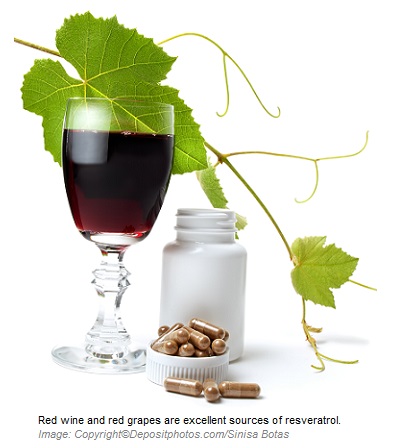Resveratrol is a flavonoid from the subtype of stillbenoid. It is a powerful  antioxidant that is famous for its lifespan-increasing and cardiovascular health-improving activities. Even though many French people do not exercise much, the risk of heart disease is low among them. This is called the “French paradox”. It is because of moderate drinking of red wine daily, which provides them resveratrol.
antioxidant that is famous for its lifespan-increasing and cardiovascular health-improving activities. Even though many French people do not exercise much, the risk of heart disease is low among them. This is called the “French paradox”. It is because of moderate drinking of red wine daily, which provides them resveratrol.
Natural Sources:
Resveratrol is found in red wine, red grapes (with highest concentration in the skin), sprouted peanuts, berries especially mulberries and blueberries, dark chocolate, and cocoa powder.
Health Benefits of Resveratrol:
- Promotes cardiovascular health by reducing risk of atherosclerosis.
- Extends cellular life span by activating the enzyme “sirtuin I”.
- Improves insulin sensitivity.
- May help reduce blood sugar level in diabetes.
- May be used in weight management by boosting body metabolism and acting as a potential calorie restriction mimetic.
- Shows anti-cancer activity against cancers of the pancreas, lung, skin, and especially prostate by inducing apoptosis (programmed cell death) in unhealthy cells and blocking angiogenesis.
- May exhibit anti – inflammatory activity in RA (rheumatoid arthritis), and asthma.
- May have a neuroprotective effect against neurodegenerative diseases, such as Alzheimer`s disease, multiple sclerosis (MS), Parkinson`s disease, and amyotrophic lateral sclerosis (ALS).
- Demonstrates activity against the viruses herpes simplex (types I and II), HIV, cytomegalovirus, and varicella zoster (causative agent for Zona or Shingles).
- May have phytoestrogen activity.
- May increase testosterone level by inhibiting the enzyme aromatase.
Dosage:
Resveratrol is taken 50 – 250 mg per day. Women with estrogen-sensitive cancers (breast, ovarian, and uterine) should exercise caution when taking resveratrol, as there are controversial reports indicating the negative impact of resveratrol on these types of cancers.

